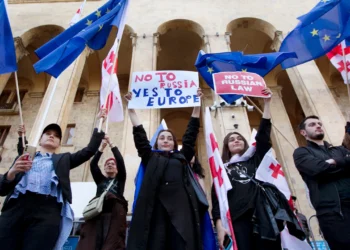Human Lives Human Rights: In recent weeks, the Russian government has once again entered into major military tensions with the Ukrainian government. Regardless of the consequences of Russia’s new tensions with Ukraine, NATO and the Western countries, can be considered as two main strategic reasons behind this crisis, which will be further explained in this article.
Russia alleges that U.S. leaders have broken promises they made in the early 1990s to not expand NATO’s membership eastward. The Russia has always considered NATO expansion project to the east as its red line and has always opposed it. But over time, as Russia’s economic power grew, so did the nature of the country’s opposition change from a phase of political opposition to obvious military action.
Among the examples of the Russia’s military action against NATO’s expansion to the east, we can consider the summer 2008 war between South Ossetia and Georgia and the military involvement in the 2014 Ukraine crisis, as well as the withdrawal of the Crimean peninsula from the country.
Regarding the reasons for Russia’s military actions against Ukraine and Georgia, it can be said that these actions have two geopolitical and legal reasons.
Evaluating the geopolitical reason for Russia’s actions, it should be noted that if countries such as Georgia and Ukraine join NATO, Russia will be completely surrounded by the United States and NATO, and its access to strategic regions such as the Caucasus and Eastern Europe will be severely restricted forever, changing the scope of its power from a world power to a regional power. Therefore, recognizing the importance of this issue, Russia seeks to prevent Georgia and Ukraine from joining NATO by taking military action.
However, while examining the legal reason of Russia’s military actions against Georgia and Ukraine, it should be noted that in 1995, a NATO study project concluded that only those who applied for membership could join NATO, who are able to secure a certain degree of independence and political sovereignty. Since then, the condition has been accepted as a fundamental principle among NATO members.
Also, given that the NATO voting system, unlike many other international organizations, is based on consensus, a negative vote by even one member of the alliance against a newcomer applying for the membership will lead to the rejection of the application.
Therefore, countries such as France and Germany also oppose Ukraine and Georgia joining NATO because they do not want to get into major tensions with Russia, because they depend on Russia for exporting fossil fuels and to meet their energy needs.
However, in the latest developments regarding Russia’s military tensions with the West and Ukraine, the Russian government, in addition to recognizing the independence of the separatist regions of eastern Ukraine, that is Luhansk and Donetsk, it has deployed troops to the two regions and is providing financial and military support to separatists in the two regions.
In fact, Russia, using its geographical proximity with the separatist regions of Ukraine is changing the actual challenge in terms of Ukraine’s imminent membership in NATO, which is a threat for Moscow, into a potential opportunity to systematically destroy the legal basis for Ukraine’s membership in NATO.
What makes the policy more tangible is Vladimir Putin’s clear and unequivocal stance on NATO’s continuing efforts to bring Ukraine and Georgia into NATO.
Therefore, following the efforts by the current Ukrainian government to move closer to the West and join NATO, Russia, by deploying troops along its western borders, has sent a clear message to Kyiv and NATO that any country crossing the red lines will face severe consequences, to the extent that if it was necessary, according to its 2020 National Security Document, it will also use nuclear weapons against further NATO expansion to the east.


















